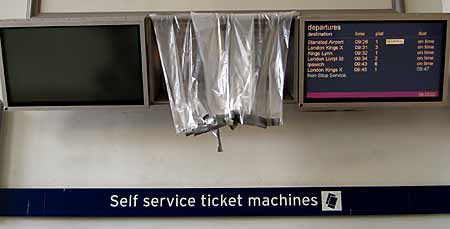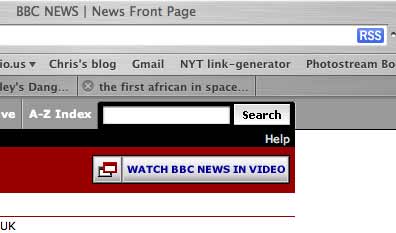… this is ridiculous.

Regular readers will know that I always photograph this display at Cambridge station when it’s showing a blue screen of death. But this morning there wasn’t even a screen, blue or otherwise. What can it mean?

… this is ridiculous.

Regular readers will know that I always photograph this display at Cambridge station when it’s showing a blue screen of death. But this morning there wasn’t even a screen, blue or otherwise. What can it mean?
Well, well. From BBC online…
Microsoft’s next version of its browser, Internet Explorer 7, will make it easier for people to keep automatically aware of website updates.
IE7 will have an orange button on the toolbar which will light up when it detects a Really Simple Syndication (RSS) feed on a site.
Users can click on a “plus” button to subscribe to the site’s feed, as they would with a bookmark.
What’s funny about this? Nothing. It’s just that I’m using Safari (the browser that comes with Mac OS X) and it has exactly this feature built in. Now.
 .
.
Still, full marks for effort to Redmond.
Interesting piece in the NYT.
From the 1986 to 1996, Microsoft’s stock soared more than a hundredfold as the company’s Windows operating system and Office applications dominated the PC industry. That explosive climb made millionaires of employees who had accepted options as a substantial part of their compensation for 60-hour workweeks fueled by a diet of Twinkies, Coca-Cola and marshmallow Peeps. The sudden riches led many to refer to themselves as “lottery winners.”
“While the exact number is not known, it is reasonable to assume that there were approximately 10,000 Microsoft millionaires created by the year 2000,” said Richard S. Conway Jr., a Seattle economist whom Microsoft hired to study its impact on Washington State. “The wealth that has come to this area is staggering.”
Even allowing for this particular consultant’s contractual obligations, it’s true that Microsoft has enriched many employees who have gone on to fund worthwhile projects. One of them, a friend of mine, gave over £1 million to UK charities before he died.
Here’s a neat little sca…, er scheme. The UK government, in its laudable attempt to raise school standards, has a ‘specialist school’ programme. The aim is to encourage schools to aspire to excellence in a particular field, and to reward such aspirations and efforts. All very right and proper, not to say admirable. As I understand it, if a school gets specialist status, then the government offers it additional funding (~£100k) provided the school can match that by raising £50k itself from companies and sponsors.
So far, so good. Schools in affluent areas can generally raise the necessary £50k, but their counterparts in poorer areas have great difficulty in raising the dosh.
Enter, stage right, a friendly US monopolist which offers to provide the sponsorship needed to tip the school over the threshold.
Hooray! Microsoft is generously donating £50k to every needy, aspirational school! What a turn-up for the books!
Er, no. In the words of the hapless Specialist Schools Trust,
Microsoft has offered to support a further 65 aspiring specialist schools. Support is for schools applying in the October 2005 bidding round only and will be in the form of a software licence entitling schools to Microsoft software titles, upgrades and support over the initial four-year development period.
Neat, isn’t it. The cost to Microsoft is precisely zilch. But the result is 65 more hapless schools being locked into a software and hardware ecology that none of them can sustain or support. It’s a bit like a re-run of those Imperialist narratives where African tribesmen sign away their natural resources for a handful of baubles. And what’s funny is that the Specialist Schools Trust professes itself “delighted” by the wheeze. That’s probably because the Trust’s worthies know as little about software as the aforementioned tribesmen knew about Uranium 235.
Microsoft understands the value of W.C. Fields’s famous adage: never give a sucker an even break.
Today’s Observer column on the benefits to UK schools of weaning themselves off Microsoft software.
The BECTA report is out. Its findings are what one would expect: significant savings and improved performance from dropping Microsoft. At last, the penny begins to drop. Yippee!
For the last two years, I’ve been working with a group of colleagues in Cambridge on a project which has the modest aim of changing the world. It’s called the Ndiyo Project. (‘Ndiyo’ is the Swahili for ‘yes’.) Our aim was to rethink computer networking to make it much more affordable, environmentally sustainable and supportable than conventional PC-based networking. Why? Because the way we currently do networking is so wasteful and expensive that poor people will never be able to afford it. Yesterday, we presented a paper on our work at a big conference sponsored by (nice irony this!) Microsoft Research in Cambridge. BBC Online picked up the story and have reported it today. Our email inbox is already creaking at the seams. Stay tuned.
We’re not going to spend taxpayers’ money on a program so that Microsoft can further consolidate its monopoly. It’s the government’s responsibility to ensure that there is competition, and that means giving alternative software platforms a chance to prosper.
Sérgio Amadeu, president of Brazil’s National Institute of Information Technology, the agency that oversees the Brazilian government’s technology initiatives.
From a New York Times article on the Brazilian government’s resolute stand on Open Source software.
According to an Associated Press report, Microsoft will use a the letter “N” to designate Windows XP versions stripped of the company’s media player to comply with an antitrust judgment from the European Union.
The agreement with the EU came after antitrust regulators rejected Microsoft’s first choice, “Windows XP Reduced Media Edition,” on grounds it would discourage sales and mislead customers.
The player-free operating system will simply go by “Windows XP Home Edition N” and “Windows XP Professional Edition N” – the “N” standing for “not with media player.”
Such a helpful page from Redmond giving “Six Tips for Buying an MP3 Player with Flash Memory”. In the interests of objectivity, the Apple Turns Blog has provided an even more helpful crib, to which I am happy to add. Let’s take the six ‘tips’ in turn, shall we?
1. Understand the basics.
For the active person, a player that uses flash memory to store music has distinct advantages over a player that uses a hard disk. Simply put, flash memory players have no moving parts, meaning that you can take them jogging and your music won’t skip.
Translation: Don’t buy an iPod, which has a nasty hard drive for storing thousands of songs, compared with the measly hundreds you can fit on a flash player.
2. Make sure you’re getting all the goodies.
Many portable music players can do more than just play music. Some players have a built-in voice recorder, FM recorder, or stopwatch. And some come with extra accessories like high-quality headphones, a belt clip, or an armband. Because most of these features are included at no additional cost, make sure the device you choose is filled with these fun extras.
Translation: you just won’t be happy unless your player can record FM radio and includes, for some reason, a stopwatch. And it just so happens that iPods don’t do any of these things.
3. You’ll want a display.
When you have hundreds of songs on your player, you really need an easy way to select your music by artist, album, or genre. This is critical if you want to find that one song or artist you really want to hear. A display also comes in handy when you’re looking for your favorite radio station.
Translation: don’t buy a nasty iPod shuffle, even if it doesn’t have a hard drive (see 1 above) because it doesn’t have a display.
4. Let a professional make your next playlist.
Having an FM radio lets you put your player on autopilot as you mountain bike, cycle, or rollerblade. And when you’re sweating it out on the stationary bike at your health club, you can listen to the program airing on the club’s TV. You want to have something that is fun, lightweight, and flexible. And FM radio is a key feature that many players offer at no extra cost, even for less than $100.
Translation: why listen to your own music when you can listen to nonstop commercials and obnoxious local DJs on FM radio? And record them digitally, so you can share that great beer jingle with your friends and loved ones?
5. Pick the right size for you.
The price of a player will depend on its storage capacity—the more megabytes (MB) of storage it has, the more music it can hold and the more it will cost. If you’re ripping your own CDs, using a player with Windows Media Audio (WMA) support as well as MP3 support gives you the most music per megabyte.
Translation: Windows Media is great, and we just wanted to harp on that for a minute. Have we mentioned that Windows Media is great? And it’s much better than that nasty compression stuff used by Apple.
6. Don’t get locked into one online store.
Have you ever been on the hunt for a particular song? Some obscure indie rock tune or rare jazz performance you heard on the radio? You might have to shop at more than one store before you find the song you’re looking for. Having the flexibility to choose from over 1 million tracks of music from multiple online music stores such as MSN Music, Napster, MusicMatch, and Wal-Mart can be the key to getting the music you want. Several stores even offer subscription services so you can download all the songs you want for about the cost of a CD each month. If you buy a device that has the PlaysForSure logo, you’ll know that you can use it with your choice of PlaysForSure music stores.
Translation: it is, however, just fine to get locked into one proprietary data format and DRM scheme– as long as it’s ours. And be sure to avoid that nasty iTunes store.
Summary:
1. Don’t buy an iPod, iPod mini, or iPod photo.
2. Don’t buy an iPod shuffle.
3. Don’t buy an iPod shuffle.
4. Don’t buy an iPod shuffle.
5. Pick the right size for you (as long as you don’t buy an iPod shuffle).
6. Don’t buy an iPod of any kind whatsoever. And don’t buy songs from Apple.